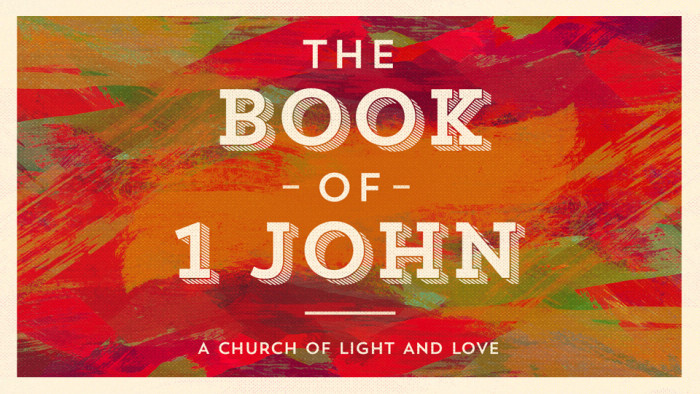
–This post is adapted from my recent sermon, “The Light of Eternity,” on 1 John 2:15-17.–
One of the more interesting things about 1 John is that the apostle is much more concerned with declarations than duties. Have you noticed how he’s consumed with declarations of truth and reality? We been in his message for a month and it’s not until 2:15 we encounter John’s first command. In fact, 1 John has fewer commands, in terms of their percent to the whole letter, than any book in the New Testament. Thus, we want to give unique attention to those imperatives he does give us.
His point in our three verses is piercing: Love for the world is incompatible love for God. Just as Jesus said you can’t love two masters, John says only one thing can ultimately captivate your affection: the world or the Father. It’s a clear separation we want to see and feel. What we want to experience from this text is what John says about the nature of true faith: Authentic faith is the treasuring of God above all else. Genuine Christians are those who, more than anything in this world—power, pleasure, possessions—treasure the surpassing beauty and glory of God.
YOU CAN’T LOVE THE WORLD AND LOVE THE FATHER
2:15 says, “Do not love the world or the things in the world.” That’s the command, but notice the verses also give us a warning, “If anyone loves the world, the love of the Father is not in him.” We must remember the Bibles warnings are not restrictions from an irritated God who doesn’t want us to enjoy ourselves. Nor are they relics of a bygone era, irrelevant to those of us in the 21st century. God’s warnings are expressions of His mercy and wisdom, given for our good to protect us from sin and its consequences. “Love for the world,” John warns, “proves you don’t love the Father.”
We need to think rightly about what John means here when he says, “Do not love the world.” Throughout John’s gospel and letters “the world” is a phrase used in different ways depending on the context. An over-simplification of it is that there are two ordinary ways to understand “the world”:
2 Ways to Understand Loving the World
- Loving the world as the holy love of redemption. Think of John 3:16 here, “For God so loved the world,” He sent Jesus to die for sin. That’s a love for the world we should emulate and cultivate in our lives. But that’s not what John is talking about here. He’s talking about . . .
- Loving the world as the selfish love of participation. This is how John most commonly refers to the world in 1 John. If you sat down and read through the whole letter in one sitting you’d notice how, for John, the world is the devil’s playground. It currently lies in his grip, 1 John 5:19 says.
I had a friend several years ago whose favorite home appliance was a vacuum sealer. He’d routinely make a large batch of some kind of food, divide it up into small plastics bag, turn on his cherished device and suck every ounce of air from the bags.
John’s telling us love for the world function like Satan’s vacuum sealer. Cherished worldly desires suck out the life in our love for God. Have you noticed your love for God waning recently? Does it feel as though your devotion and joy in Christ is disappearing? Our text says it’s probably because your love for the world is raging in fresh ways. You can’t love the world and love the Father.
Throughout the ages of Christianity people have often defined worldliness as living outside a specific set of rules or conservative standards. If you listen to music with a certain beat, dress in fashionable clothes, watch movies of a certain rating, or indulge in certain luxuries of modern society, you must be worldly. Others have called out these fundamentalist tendencies and assumed worldliness is impossible to adequately define, so we shouldn’t even bother with it.
Yet John, inspired by the Holy Spirit, cuts through both false ideas by taking us the debate down to its true level: to the heart. For that’s where worldliness is. Notice what he says in 2:16, “For all that is in the world—the desires of the flesh and the desires of the eyes and pride of life—is not from the Father but is from the world.”
He gives us three perspectives on worldliness. Let’s take each one in turn.
- “The desires of the flesh.” This is quite broad, it has in mind any sinful interest that draws us away from God or any sinful passion that makes fellowship with God impossible. We might think of this as the preoccupation or obsession with things of the flesh. For many today this it’s something like the preoccupation with physical pleasure that often manifests itself in pornography, and physical gratification outside of God’s design in marriage. Or for others it’s the obsession with body image, the compulsive chiseling of a body that will soon lie in dust. Obsessive desires of the flesh chip away at one’s obsession with God.
- “The desires of the eyes.” The eyes are like window into the soul, giving us chances to not just see, but to covet. This is what happened with Eve in the Garden of Eden, she saw the fruit was pleasing to the eye (Gen. 3:6). This is what happened with David when he committed adultery with Bathsheba, he saw “the woman was very beautiful” (2 Sam. 11:2). The old children’s song is right when it warns, “Oh be careful little eyes what you see.” What sights consume you vision each day? Satan loves paint and put pretty things in front of you and dare you to resist. Sometimes his schemes are overt, but most of the time they are covert. He’s ripping apart your love for God with all kinds of little things your eyes take in each day. Satisfying the sinful desires of your eyes steals captivation with God’s beauty.
- “The pride of life.” One way to translate this phrase, and better captures the meaning John has, is, “The pride of possessions.” In this perspective worldliness is the boastful pleasure in what you are in the world and what you have in the world. The worldliness of pride puts self on the stage and says, “Gaze upon my greatness.” We do this in so many subtle ways. How often in a conversation do you insert something about your life, so that people might be impressed?
What are you tempted to love more than God? How you answer that question exposes the place where worldliness has crept into your heart.
So then, what is worldliness? From 2:16 here’s my definition: the gratification and exaltation of oneself to the exclusion of God. It’s to cherish the treasure of me more than the treasure of God.
You can’t love the world and love the Father. Notice now in 2:17 how John says, “You Can’t Love the World and Live Forever.”
YOU CAN’T LOVE THE WORLD AND LIVE FOREVER
He writes in 2:17, “And the world is passing away along with its desires, but whoever does the will of God abides forever.” As sure as any snow that falls in Texas will eventually melt, so too will this world and its desires pass away. So John’s point is, “Why on earth would you preoccupy yourself with them?” Pray for God to protect you from, what John Owen called, “living affections to dying things.” Did you see the promise in 2:17? “Whoever does the will of God abides forever.” Spirit-wrought obedience is the great seal of salvation and gives assurance of life everlasting. There is no future whatsoever in the things of this world, but there is a future in godliness. As Paul says in 1 Timothy 4:8, godliness “holds promise for the present life and also for the life to come.” Love the world and die forever, or love the Father and live forever—which will you choose?
Last year when I turned thirty I had spent time considering my first three decades of life, my successes and failures. I found myself resonating with Philip Henry, the father of Matthew Henry, who said at the dawning of his fourth decade: “So old and older than Alexander when he conquered the great world; but I have not subdued the little world of myself.” Have you ever felt that way? Maybe you are even feeling that way now, in light of our text?
The Bible’s warnings intend to call us to sober self-examination. While being a vital thing, examination is a dangerous thing. The Spirit means for it to stir us to conviction, yet Satan means for it to stir us to condemnation. The Wicked Worm loves to speak into your hearts lies like, “You’ll never be able to give up the things of earth you love so much. You are beyond hope.”
You are beyond hope if you try to overcome the world with your own strength of self-denial. You are beyond hope if you try to conquer desires of the flesh, desires of the eyes, and the pride of life with strenuous, near monastic self-control. So how can we overcome? Flip over to 1 John 5:4, “For everyone who has been born of God overcomes the world. And this is the victory that has overcome the world—our faith.” Faith in Jesus makes one born again, and the new birth severs our satisfaction with the world. He overcame so that we might overcome. Authentic faith is the treasuring of Christ above all else.
—————————————————————————————————–



